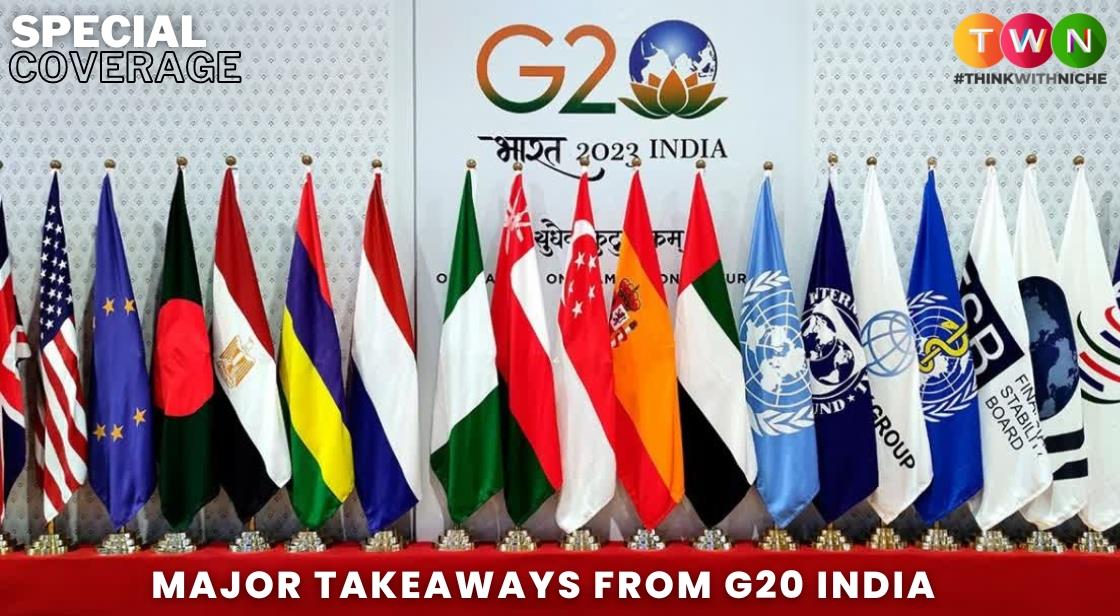Major Takeaways from the G20 Summit 2023 India

Blog Post
The G20 Summit 2023 held in New Delhi marked a significant milestone in India's diplomatic journey. This global forum witnessed India's adeptness in garnering consensus among nations on pressing global concerns.
From addressing the Ukraine conflict with diplomatic finesse to championing the cause of financial inclusion and sustainable development, India played a pivotal role in shaping the outcomes of this summit.
In this article, we explore the major takeaways from the G20 Summit 2023, highlighting India's diplomatic achievements and the global impact of the decisions made during this event.
Join us as we dissect the key highlights and significant strides made on the world stage.
The G20 Summit of 2023, hosted in the vibrant city of New Delhi, stands as a pivotal moment in India's diplomatic narrative. This international gathering showcased India's remarkable prowess in rallying nations around critical global issues.
From its deft handling of the Ukraine conflict to its steadfast commitment to financial inclusion and sustainable development, India emerged as a prominent influencer of global policy decisions.
In this comprehensive exploration, we delve into the major takeaways from the G20 Summit 2023, shining a spotlight on India's diplomatic triumphs and the profound global implications of the decisions forged during this historic event.
Join us as we dissect the key highlights and significant strides made on the world stage.
A Successful G20 Summit in Delhi
The G20 summit held in Delhi has been a remarkable success for India, showcasing its ability to foster consensus among member nations. The achievement lies in formulating a statement that tactfully avoids explicit mention of Russia's invasion of Ukraine, a contentious issue that had strained relations among the G20 nations.
During India's G20 presidency, even G20 ministerial meetings had been marred by discord over this topic.
In contrast to the previous year's Bali Declaration, which unequivocally labeled Russia as the aggressor and demanded the unconditional withdrawal of its troops from Ukraine, the New Delhi G20 summit 2023 Declaration diplomatically termed it as "the war in Ukraine." Notably, there was no direct condemnation of Russia, marking a significant departure from the Bali Declaration.
This consensus reflects the Western bloc's eagerness to avert any perception of a G20 breakdown in India. The United States, along with other Western G20 members, consented to toning down the language surrounding the conflict, recognizing India's diplomatic victory and underscoring its pivotal role in global geopolitics.
The G20 summit's outcome underscores India's diplomatic finesse and its growing importance on the international stage as nations seek to navigate complex geopolitical dynamics.
Key Takeaways from the G20 Summit 2023
1. Empowering the African Union
A significant development at the G20 summit was the formal inclusion of the African Union (AU) as a permanent member. This move elevates the AU to the same status as the European Union (EU) within the G20, a crucial step toward enhancing the group's representativeness. Historically, only South Africa had held membership in the G20 on behalf of the African continent.
The inclusion of the AU serves to amplify the voices of the Global South within the G20, countering the long-standing dominance of G7 nations in the group's deliberations.
This strategic expansion follows a similar trend observed in the BRICS group, which comprises emerging economies dominated by China and Russia.
The BRICS recently broadened its membership to encompass countries such as Saudi Arabia and Iran, signaling an effort by Beijing to potentially create an alternative to the G20.
These developments highlight the evolving dynamics of global forums and reflect efforts to ensure more equitable representation and influence among nations, particularly those from the Global South.
2. A More Nuanced Approach to the Ukraine Conflict
During the G20 summit, member nations came to an agreement on addressing the Ukraine conflict using a more diplomatically nuanced approach. While the declaration acknowledged the illegitimacy of forcibly acquiring territory and emphasized the plight of the Ukrainian people, it refrained from direct criticism of Russia's actions in the war.
This stance represents a departure from the G20's previous position, where Russia was openly condemned for its involvement in the conflict and pressured to withdraw its troops from Ukraine without conditions.
Diplomatic insiders noted that a direct condemnation of Russia would have been unacceptable to the nation. Nevertheless, the outcome is viewed as a diplomatic success, as all G20 members, including Russia, pledged not to engage in territorial expansion through force.
India, in collaboration with Brazil, Indonesia, and South Africa, played a pivotal role in averting a schism within the G20 over the Ukraine crisis. This underscores the increasing influence of emerging nations from the Global South within the group's dynamics.
4. Collaborative Initiative for a Strategic Transport Corridor
During the G20 summit, leaders from the United States, India, and Saudi Arabia, among others, unveiled an ambitious plan to establish a comprehensive rail and port network connecting the Middle East, South Asia, and eventually Europe.
This initiative, described by U.S. President Joe Biden as a significant development, holds great promise for regional connectivity and economic growth.
The Biden administration sees this endeavor as a strategic move to counter China's expansive Belt and Road infrastructure initiative. By positioning Washington as an alternative partner and investor for developing countries within the G20, the U.S. aims to provide an attractive and competitive option for nations seeking infrastructure development.
While the announcement generated enthusiasm, the plan lacks specific details regarding financing and a precise timeline. The proposed project entails laying down railway lines across the Middle East and establishing connections to India through strategically located ports, fostering enhanced trade and economic ties among the participating regions.
5. Fostering Economic Growth, Employment, and Stability
The G20 summit's declaration acknowledges the precarious state of the global economy, emphasizing the imperative need for well-balanced policies aimed at fostering sustainable economic growth, reducing disparities in wealth, and ensuring overall stability.
Central to this commitment is the determination of G20 central banks to pursue price stability and prioritize the independence of these financial institutions. This approach is seen as fundamental to maintaining economic equilibrium and bolstering confidence in financial systems.
Furthermore, the declaration underscores the importance of deploying temporary and targeted fiscal measures as a means to protect vulnerable populations from economic shocks. This demonstrates a collective commitment to ensuring that the benefits of economic progress are shared equitably among all segments of society.
Recognizing the pivotal role of the private sector in creating inclusive and resilient global value chains, the declaration encourages cooperation between governments and businesses. Such collaborations are deemed essential for driving innovation, economic growth, and job creation on a global scale.
Additionally, the declaration highlights the significance of adhering to a rules-based, fair, transparent multilateral trading system through institutions like the World Trade Organization (WTO). This commitment aims to promote international trade that is conducted in an equitable and predictable manner, benefiting economies worldwide.
6. Advancing Financial Inclusion and Digital Public Infrastructure
The G20 declaration strongly advocates for the responsible utilization of technological advancements, particularly innovative payment systems, to promote and realize the objectives of financial inclusion. This reflects a commitment to leveraging technology for the greater good of providing access to financial services for all.
Notably, the G20 has embraced the 2023 Financial Inclusion Action Plan (FIAP), which serves as a comprehensive roadmap to drive financial inclusion, with a particular emphasis on individuals and Micro, Small, and Medium Enterprises (MSMEs). This strategic framework underscores the significance of ensuring that all members of society have the opportunity to participate in the financial system.
An important milestone achieved during the summit is the adoption of a comprehensive definition of Digital Public Infrastructure (DPI) by G20 leaders. This definition serves as a foundation for understanding the critical role that digital infrastructure plays in modern economies.
Furthermore, India has announced plans to establish a Global Digital Public Infrastructure Repository (GDPIR), demonstrating its commitment to harnessing digital technologies for the benefit of low and middle-income countries. Additionally, the proposal of the One Future Alliance (OFA), a voluntary initiative aimed at implementing DPI in such countries, showcases a collective effort to bridge digital divides and promote inclusive development.
7. Advancing Sustainable Development Goals (SDGs)
The G20 leaders have acknowledged the challenges and setbacks encountered in the pursuit of the Sustainable Development Goals (SDGs) and have expressed a collective commitment to mobilize affordable financial resources to support developing nations in their efforts to achieve these vital objectives.
Specifically, in the realm of Hunger and Food Security, the G20 has adopted the Deccan High-Level Principles on Food Security and Nutrition. This signifies a strong focus on research collaboration, enhancing access to agricultural resources, and promoting fair agricultural trade practices. Importantly, the discouragement of export prohibitions underscores the commitment to fostering global food security.
In the field of Health, the G20 leaders have made substantial commitments to bolster primary healthcare systems and strengthen the healthcare workforce. These efforts are geared towards improving essential health services and ensuring equitable access to medical countermeasures, emphasizing the importance of global health and well-being.
Moreover, within the sphere of Education, the G20 has pledged to promote inclusive, equitable, and high-quality education for all. The strategic utilization of digital technology is recognized as a critical means to bridge educational divides, emphasizing the role of education in achieving broader sustainable development goals.
8. Progressive Steps Towards Climate Action
At the G20 Summit, world leaders have taken significant strides in addressing climate change. They have collectively agreed to pursue an ambitious goal of tripling global renewable energy capacity by the year 2030. This commitment underscores their recognition of the urgent need to transition to cleaner energy sources to combat climate change effectively.
Additionally, there's a unanimous acknowledgment of the imperative to phase down unabated coal power. Although specific targets weren't set, this represents a crucial step towards reducing greenhouse gas emissions from one of the most carbon-intensive energy sources.
While the G20 did not provide a detailed plan to amend existing policies and targets for renewable energy expansion, there's a recognition of the substantial financial investment required. A staggering $4 trillion annually is estimated to be necessary to facilitate a green energy transition, although a precise roadmap to achieve this goal remains to be established.
The deliberations at the G20 Summit hold particular significance in the context of the upcoming COP28 U.N. climate summit scheduled to take place in the United Arab Emirates later this year.
Key climate-focused highlights from the G20 Summit include:
-
Paris Agreement Implementation: G20 member nations have reiterated their commitment to fully implement the Paris Agreement. This commitment is framed considering equity and the principle of common but differentiated responsibilities (CBDR).
-
Net-Zero Emissions: A notable commitment has been made to strive for global net-zero emissions or carbon neutrality by the year 2050. This pledge takes into account scientific advancements and diverse approaches to achieve this crucial target.
-
Promotion of Sustainable Lifestyles: G20 leaders have endorsed principles aimed at promoting sustainable lifestyles as a proactive measure to combat climate change. These principles are geared towards achieving significant reductions in emissions by 2030.
-
Energy Transitions: There's a strong emphasis on accelerating the adoption of clean, affordable, and inclusive energy transitions. This includes a commitment to tripling global renewable energy capacity by 2030 and providing support to developing countries in their efforts to transition towards low-carbon energy systems.
-
Climate Finance: The G20 Summit's declaration recognizes the need for specific pathways to finance climate-related initiatives. These pathways encompass public finance, private sector investments, and support from Multilateral Development Banks (MDBs).
9. Advancing Women-Centric Development
At the G20 Summit, a resolute commitment has been made to champion "women-led development" and to uphold the principle of women's equitable participation in decision-making processes. This pledge underscores the imperative of fostering an inclusive and gender-balanced approach to development on a global scale.
To translate this commitment into action, a multifaceted approach is being adopted:
-
Enhancing Educational Opportunities: The G20 declaration underscores the importance of improving educational access and quality, particularly for women. This encompasses initiatives aimed at ensuring that women have equal access to educational resources and opportunities to excel in various fields.
-
Expanding Employment Opportunities: An integral part of this commitment involves creating an environment that fosters increased employment opportunities for women. This entails addressing existing gender disparities in the workforce and promoting equal representation across industries.
-
Ensuring Social Protection: The declaration also emphasizes the need to establish robust social protection mechanisms, especially for women. These mechanisms aim to provide support and security to women facing economic or social challenges.
-
Eliminating Gender-Based Violence and Bias: A critical aspect of this commitment is the unequivocal rejection of gender-based violence and biases. Efforts will be directed towards eradicating systemic discrimination and violence against women in all its forms.
As a testament to their dedication to this cause, the G20 leaders have agreed to establish a dedicated Working Group on Empowerment of Women. This group will play a pivotal role in advancing these initiatives and ensuring their effective implementation, with a particular focus during the upcoming Brazilian G20 Presidency.
10. Launching the Global Biofuels Alliance: A Vision for Sustainable Energy
During the G20 Summit, Prime Minister Narendra Modi unveiled a groundbreaking initiative known as the Global Biofuels Alliance (GBA). This visionary endeavor has garnered support from nineteen countries and twelve international organizations, comprising both G20 member nations and non-members alike.
The founding members of this alliance include India, Brazil, and the United States, marking a significant step towards global cooperation in the realm of biofuels.
The overarching mission of the GBA is to serve as a catalyst for worldwide collaboration in advancing and fostering the widespread adoption of biofuels. By bringing together diverse stakeholders, the alliance aspires to harness the potential of biofuels as a sustainable energy source with far-reaching environmental and economic benefits.
Furthermore, the GBA is poised to become a central repository of knowledge and an expert hub. This strategic role will enable the alliance to pool resources, share expertise, and facilitate research and development efforts in the field of biofuels.
In doing so, the GBA aims to accelerate the transition towards cleaner and more sustainable energy solutions on a global scale.
Conclusion:
The G20 Summit of 2023, held on the grand stage of New Delhi, not only demonstrated India's diplomatic finesse but also underscored its growing role in shaping global narratives. This summit was a testament to India's ability to broker consensus among nations, even on contentious issues like the Ukraine conflict, where diplomatic nuance prevailed.
The inclusion of the African Union as a permanent member and the expansion of the BRICS group showcased a shifting landscape in global forums, with emerging powers seeking greater representation and influence.
The strategic partnership for a transport corridor spanning continents opened new doors for economic growth and connectivity.
The G20 leaders' commitment to sustainable development, financial inclusion, and climate action reflects a collective resolve to address pressing global challenges. Initiatives such as the Global Biofuels Alliance further emphasize the importance of collaboration in finding sustainable energy solutions.
Empowering women and ensuring their participation in decision-making processes is not just a promise but a cornerstone of global development. The establishment of a dedicated Working Group on Empowerment of Women reaffirms this commitment.
As the world navigates complex geopolitical shifts and seeks solutions to shared challenges, the G20 Summit 2023 highlighted India's prominent role in shaping the global agenda.
It was a momentous event where nations came together to chart a course toward a more equitable, sustainable, and inclusive world.
India's diplomatic achievements and the outcomes of this summit will resonate far beyond its borders, shaping the future of international cooperation and progress.
You May Like
EDITOR’S CHOICE












